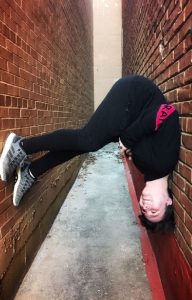When you think back to what you remember learning in any formal educational setting, I am betting you remember things like field trips, interactive projects, or lessons on topics related to your interests. We need something to attach or relate new knowledge to remember it. We need to be able to use this knowledge and apply it to something that is meaningful to us. When we are learning through an activity that engages us, it allows us to apply the knowledge and to test it and maybe even create new knowledge through experimentation. Examples of this type of learning can be seen in the use of online resources for self-directed learning and business learning models.
My son has been teaching himself to do flips and other freerunning moves by watching YouTube videos and following blogs. His progress has been amazing. He reads to find a trick he wants to learn, watches videos, and then goes outside and practices. When he encounters a problem, he goes back and reads, asks questions, and re-watches videos. Then more practice. He also verbally explains to me what he is doing and what he needs to work on. This process is textbook learning theory in action!
An important goal for many business training workshops is to get participants to use the concepts that they learn in their workplace within twenty-four hours. Experience has shown that if new skills are not used in the workplace within twenty-four hours, they will most likely not be implemented at all. In the training industry, the 10/20/70 model is commonly used as a guideline for employee training. This model states that ten percent of an employee’s job skills are obtained from formal learning from workshops and formal training sessions, twenty percent are achieved from informal coaching and interactions with others, and seventy percent come from on the job experience. I wonder how effective this strategy would be in the classroom.
 In a perfect world, all learning would take place in the setting where it is used. In the traditional classroom, often the best we can do is answer the “So what? Why do I need to learn this?” with lessons that provide interaction, stimulate emotional attachment, and create interest. However, with homeschooling, we have the freedom to learn anywhere and in any way that works for our children. There are huge benefits to teaching our children to be self-directed learners and providing opportunities for them to learn by doing. Techniques to accomplish this include discussing concepts about your community and allowing students to approach a project through the lens of their interests. Involving community members in your learning activities and using local community resources can help students attach meaning to new knowledge and to relate that knowledge to real life experiences. Using online resources can also support students in pursuing their personal interests as they work on projects and assignments. These techniques allow students to see value and application in what they are learning.
In a perfect world, all learning would take place in the setting where it is used. In the traditional classroom, often the best we can do is answer the “So what? Why do I need to learn this?” with lessons that provide interaction, stimulate emotional attachment, and create interest. However, with homeschooling, we have the freedom to learn anywhere and in any way that works for our children. There are huge benefits to teaching our children to be self-directed learners and providing opportunities for them to learn by doing. Techniques to accomplish this include discussing concepts about your community and allowing students to approach a project through the lens of their interests. Involving community members in your learning activities and using local community resources can help students attach meaning to new knowledge and to relate that knowledge to real life experiences. Using online resources can also support students in pursuing their personal interests as they work on projects and assignments. These techniques allow students to see value and application in what they are learning.
When we think in terms of specific courses or lesson standards, the concept of learning by doing may seem difficult to plan out and evaluate. I think this is one of those times when we must work backward in our planning. Start with what your child is interested in and see where you can go with that interest. Visit local businesses, parks, or museums that relate to the interest and let your child talk with people and ask questions. Just spend some time talking with your child about what you are seeing and doing. You will start seeing connections to the more formal lessons you are teaching, and you will see the value of your child being able to connect new knowledge to these experiences. The benefit of this type of learning goes way beyond the initial interest. My son has learned amazing video production techniques through filming his tricks and editing these films to post online. He has greatly improved his writing by composing blog posts on his favorite freerunning and parkour websites. He has strengthened his time management skills, so that he can fit in practice time with school work. Most importantly, he has learned these skills, because he needed them to do something that was of interest and value to him. This type of learning lasts a lifetime, not just through test day.




